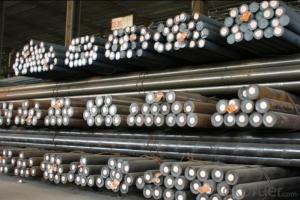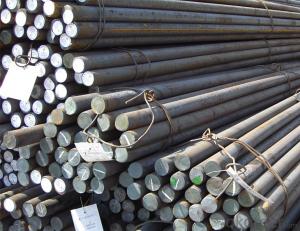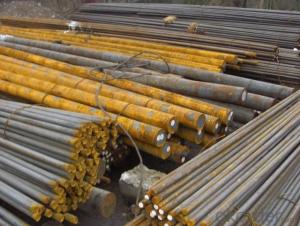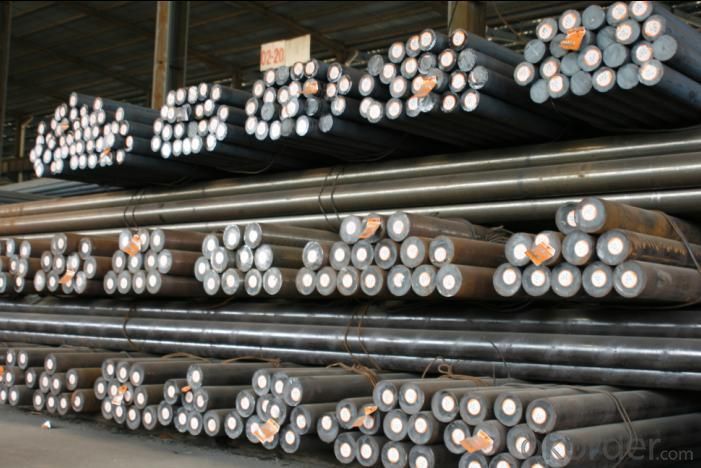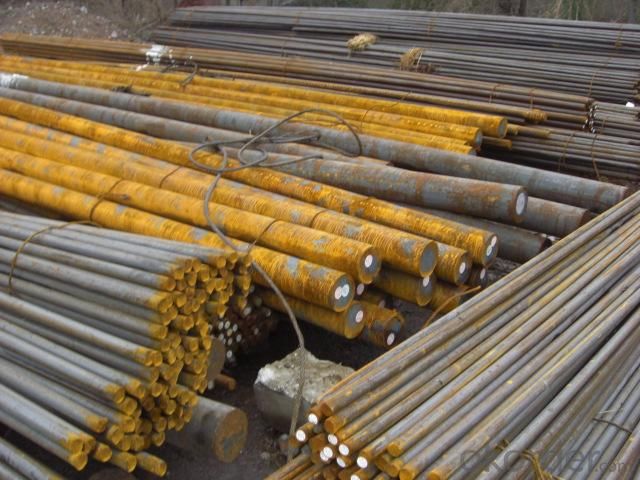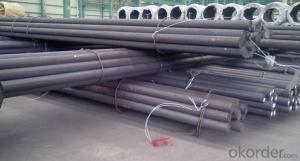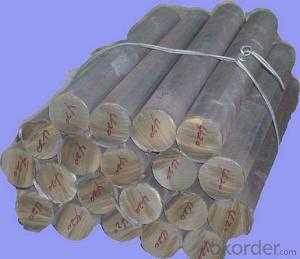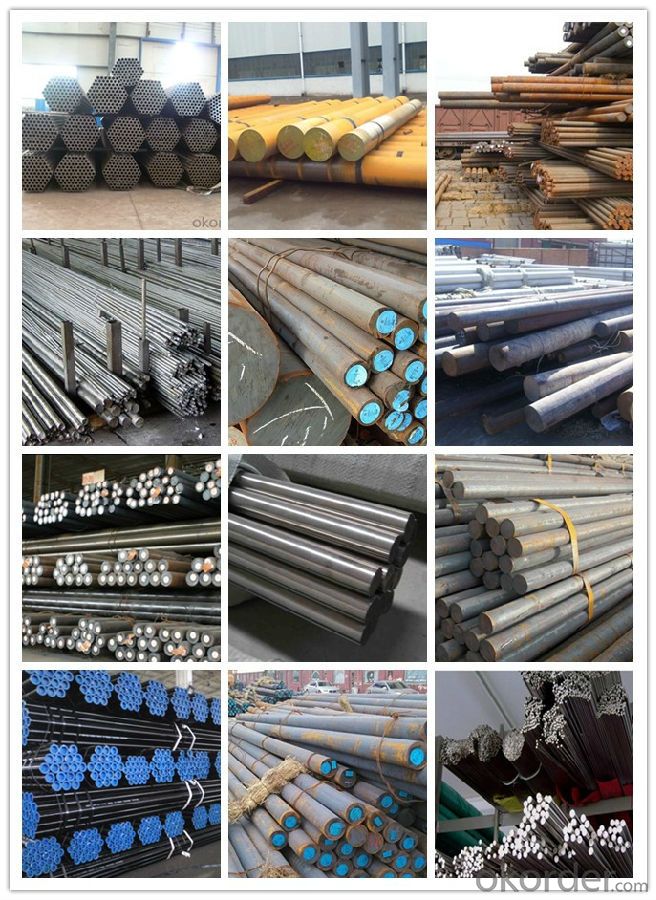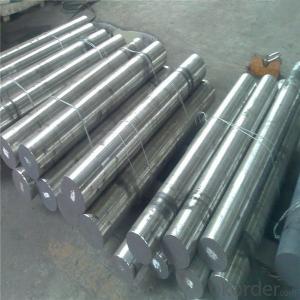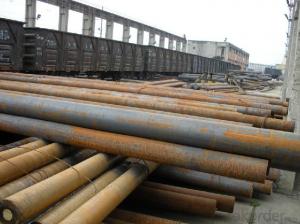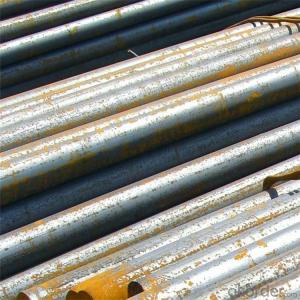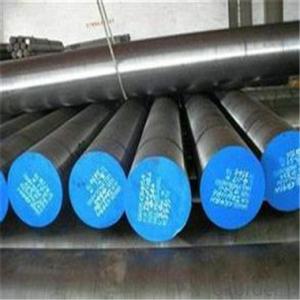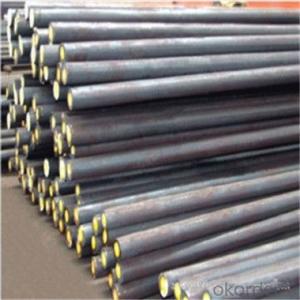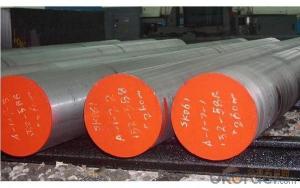Special Steel S45C Round Bar Steel Billet
- Loading Port:
- China main port
- Payment Terms:
- TT OR LC
- Min Order Qty:
- 30 m.t.
- Supply Capability:
- 10000 m.t./month
OKorder Service Pledge
OKorder Financial Service
You Might Also Like
Specification
Product Introduction
| 1.Specification | ||||||||
| Round bar | Diameter(mm) | Length (mm) | ||||||
| 20~600 | 3000~9000 | |||||||
| Plate | Thickness(mm) | Width (mm) | Length (mm) | |||||
| Max:800 | Max:2200 | Max:9000 | ||||||
| *Specification can be customized for sure. | ||||||||
| 2.Chemical Compositons | ||||||||
| Grade | C | Si | Mn | P | S | Cr | Mo | Ni |
| SCM440 | 0.38~0.45 | 0.17~0.37 | 0.50~0.8 | ≤0.035 | ≤0.035 | 0.9~1.2 | 0.15-0.25 | ≤0.3 |
| 4140 | 0.40~0.45 | 0.15~0.35 | 0.75~1.0 | ≤0.035 | ≤0.040 | 0.8~1.1 | 0.15-0.25 | - |
| SCM415 | 0.38~0.43 | 0.15~0.35 | 0.60~0.9 | ≤0.030 | ≤0.030 | 0.9~1.2 | 0.15-0.30 | ≤0.25 |
| 1.7225 | 0.38~0.45 | ≤0.40 | 0.60~0.9 | ≤0.025 | ≤0.035 | 0.9~1.2 | 0.15-0.30 | |
| 3.Delivery Conditions | ||||||||
| Hot forged +Rough machined (black surface after Q/T)+ Turned (optional) | ||||||||
| 4.Typical Applications | ||||||||
| a.Statically and dynamically stressed components for vehicles | ||||||||
| b.Parts of larger cross-sections, crankshafts, gears | ||||||||
| c.Gears, stem assemblies, | ||||||||
| d.Pump shafts and tool holders | ||||||||
Product show
Workshop show
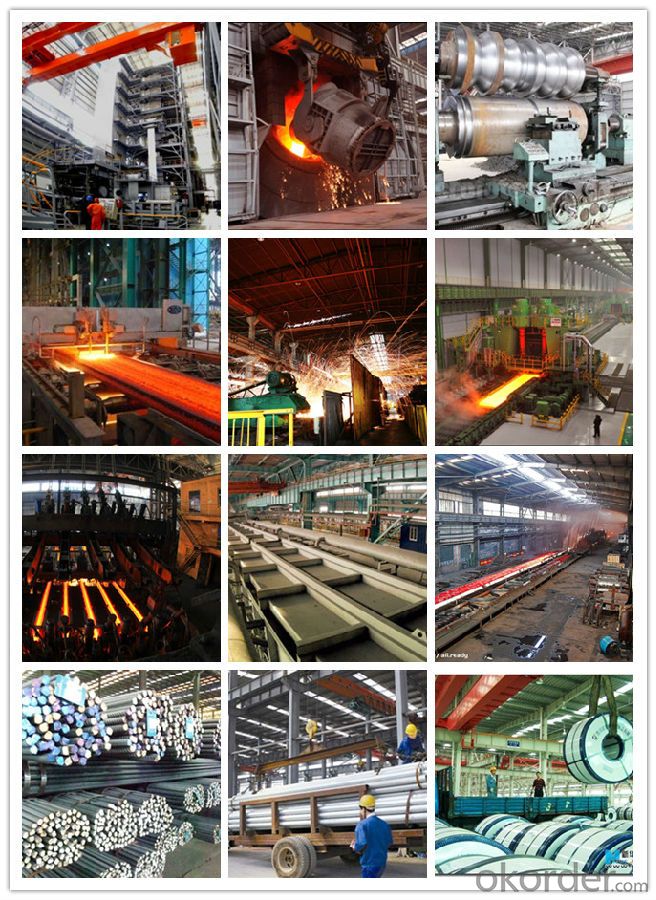
Shipping
1. FedEx/DHL/UPS/TNT for samples, Door-to-Door;
2. By Air or by Sea for batch goods, for FCL; Airport/ Port receiving;
3. Customers specifying freight forwarders or negotiable shipping methods!
Delivery Time: 3-7 days for samples; 5-25 days for batch goods.
Payment Terms
1.Payment: T/T, L/C, Western Union, MoneyGram,PayPal; 30% deposits; 70% balance before delivery.
2.MOQ: 1pcs
3.Warranty : 3 years
4.Package Informations: 1) EXPORT, In 20 feet (GW 25 ton) or 40 feet Container (GW 25 ton)
2)as customer's requirement
Why choose us?
(1) The leading exporter in China special steel industry.
(2) Large stocks for various sizes, fast delivery date.
(3) Good business relationship with China famous factories.
(4) More than 7 years steel exporting experience.
(5) Good after-sales service guarantee.
- Q: What are the different methods of improving the creep resistance of special steel?
- There are several methods for improving the creep resistance of special steel. One approach is through alloying, where specific elements such as chromium, molybdenum, and tungsten are added to enhance the steel's creep resistance. Another method involves heat treatment processes such as annealing or quenching and tempering, which can refine the microstructure and increase the steel's resistance to creep deformation. Surface treatments like carburizing or nitriding can also be employed to improve the creep resistance of special steel. Furthermore, controlling the grain size and texture through techniques like grain refinement or grain boundary engineering can enhance the steel's resistance to creep. Finally, proper design considerations, such as reducing stress concentrations and optimizing component geometry, can also contribute to improving the creep resistance of special steel.
- Q: How is special steel used in the production of hydraulic components?
- Special steel is used in the production of hydraulic components due to its high strength, corrosion resistance, and ability to withstand extreme pressure and temperature conditions. It helps in manufacturing durable and reliable hydraulic parts such as cylinders, valves, fittings, and pistons, ensuring efficient functioning and long-lasting performance of hydraulic systems.
- Q: What are the different types of coatings for special steel?
- There are several types of coatings that can be applied to special steel to enhance its performance and protect it from various environmental factors. Some of the common types of coatings for special steel include: 1. Zinc-based coatings: These coatings, such as galvanized steel, provide excellent corrosion resistance. The zinc layer acts as a sacrificial barrier, protecting the underlying steel from rusting. 2. Epoxy coatings: Epoxy coatings are highly resistant to chemicals, moisture, and abrasion. They are often used in industries where the steel is exposed to harsh conditions or corrosive substances. 3. Powder coatings: Powder coatings offer a durable and attractive finish to special steel. They are applied as a dry powder and then cured under heat, forming a hard, protective layer that is resistant to chipping, fading, and corrosion. 4. Ceramic coatings: Ceramic coatings are known for their high-temperature resistance and excellent thermal insulation properties. They are often used in applications where the steel is exposed to extreme heat or rapid temperature changes. 5. Organic coatings: Organic coatings, such as acrylics and polyurethanes, provide a protective barrier against moisture, UV radiation, and chemicals. They are commonly used in outdoor applications, such as architectural structures or automotive parts. 6. Phosphate coatings: Phosphate coatings are primarily used as a pre-treatment before applying other coatings or paints. They improve adhesion and corrosion resistance of subsequent layers, providing a more durable finish. 7. Polymer coatings: Polymer coatings offer excellent resistance to abrasion, impact, and chemicals. They are commonly used in industrial settings where steel is subject to heavy wear and tear. It is important to select the appropriate type of coating based on the specific requirements of the special steel and the environment it will be exposed to. Each coating type has its own set of advantages and limitations, so a thorough analysis should be conducted to determine the most suitable option.
- Q: What are the challenges in machining special steel with complex geometries?
- Some of the challenges in machining special steel with complex geometries include the difficulty in maintaining dimensional accuracy due to the intricate shapes, the potential for tool wear and breakage due to the high hardness and toughness of the steel, and the need for specialized cutting tools and techniques to effectively shape the intricate geometries. Additionally, the heat generated during machining can affect the material properties of the steel, leading to potential distortions or residual stresses in the final product.
- Q: What are the properties of high-temperature tool steel?
- High-temperature tool steel possesses a combination of properties that make it suitable for use in high-temperature applications. It has excellent hardness, toughness, and wear resistance, enabling it to withstand extreme temperatures without losing its shape or strength. Additionally, it exhibits good thermal conductivity and dimensional stability, ensuring that it maintains its form and performance even under high heat and thermal cycling.
- Q: What are the typical mechanical properties of special steel?
- The typical mechanical properties of special steel may vary depending on the specific grade and composition of the steel, but there are some general characteristics that can be expected. Special steels are often designed to have enhanced properties compared to standard carbon steels, making them suitable for specific applications that require superior strength, hardness, or resistance to wear and corrosion. One of the key mechanical properties of special steel is its high tensile strength. Special steels are typically engineered to have higher strength levels than standard steels, enabling them to withstand heavy loads and stresses without deformation or failure. This makes them ideal for use in industries such as construction, automotive, and aerospace, where structural integrity is crucial. Special steels also exhibit excellent hardness, which is a measure of a material's resistance to permanent indentation or scratching. This property is often achieved through alloying elements and heat treatment processes that increase the steel's ability to resist wear and abrasion. Consequently, special steels are commonly used in tools, cutting equipment, and machinery components that are subjected to severe wear conditions. Moreover, special steel alloys can possess exceptional toughness, which refers to the material's ability to absorb energy and resist fracture under impact or sudden loading. This is particularly important in applications where impact resistance is vital, such as in the manufacturing of heavy-duty machinery or structures subjected to dynamic loads. In addition to strength, hardness, and toughness, special steels may also exhibit improved corrosion resistance compared to standard steels. This is achieved by incorporating alloying elements such as chromium, nickel, or molybdenum, which create a protective oxide layer on the surface of the steel, preventing or slowing down the process of corrosion. This property is highly desirable in industries that deal with corrosive environments, such as marine, oil and gas, and chemical processing. In summary, the typical mechanical properties of special steel include high tensile strength, excellent hardness, exceptional toughness, and improved corrosion resistance. These properties enable special steels to excel in various applications where superior performance is required, making them essential in numerous industries around the world.
- Q: What are the factors that affect the wear resistance of special steel?
- The factors that affect the wear resistance of special steel include the composition of the steel, the hardness of the steel, the presence of carbides or other strengthening elements, the microstructure of the steel, the presence of surface treatments or coatings, the contact load or pressure applied to the steel, the sliding speed or velocity of the contact, the temperature at which the steel is operating, and the presence of any abrasive or corrosive media.
- Q: How does special steel contribute to the aerospace defense industry?
- Special steel plays a crucial role in the aerospace defense industry by providing the necessary strength, durability, and resistance to extreme conditions that are required for various applications in aircraft and defense systems. One of the key contributions of special steel in this industry is its ability to withstand high temperatures and pressures. In aircraft engines, for example, special steel alloys are used to manufacture turbine blades and other components that are constantly exposed to extremely hot gases. These alloys have excellent heat resistance properties, allowing them to retain their strength and structural integrity even in such demanding conditions. Additionally, special steel is also highly resistant to corrosion and erosion, making it ideal for aerospace applications. Aircraft and defense systems often operate in harsh environments, including exposure to saltwater, moisture, and other corrosive elements. Special steel alloys, such as stainless steel, are used to prevent rusting and corrosion, ensuring the longevity and reliability of critical components. Moreover, special steel is used in the manufacturing of armor plates and ballistic protection systems for military vehicles and aircraft. Its high tensile strength and impact resistance make it an essential material for these applications, providing enhanced protection to military personnel and assets. Furthermore, special steel is utilized in the production of landing gears, wing components, and airframe structures. These components must withstand tremendous forces and stresses during takeoff, landing, and flight, making the strength and durability of special steel crucial for the safety and performance of aerospace systems. In summary, special steel significantly contributes to the aerospace defense industry by providing the necessary strength, durability, and resistance to extreme conditions required for various applications. Its ability to withstand high temperatures and pressures, resistance to corrosion and erosion, and high tensile strength make it an indispensable material in the manufacturing of aircraft engines, armor plates, ballistic protection systems, and other critical components.
- Q: How is special steel used in the marine supply chain?
- Special steel is widely used in the marine supply chain for various applications. It is commonly used in the construction of ships and offshore structures due to its high strength, corrosion resistance, and durability. Special steel is used for manufacturing ship hulls, propeller shafts, engine components, and other critical parts that require exceptional strength and resistance to harsh marine environments. Additionally, special steel is utilized in the production of marine equipment such as anchors, chains, wire ropes, and connectors, ensuring their reliability and safety in maritime operations.
- Q: How is maraging steel used in the production of rocket and missile components?
- Maraging steel is commonly used in the production of rocket and missile components due to its exceptional strength, toughness, and resistance to corrosion. Its unique properties allow for the creation of lightweight yet highly durable parts, such as rocket nozzles, casings, and guidance systems. Additionally, maraging steel can withstand extreme temperatures and pressures, making it suitable for the demanding conditions of space and military applications.
Send your message to us
Special Steel S45C Round Bar Steel Billet
- Loading Port:
- China main port
- Payment Terms:
- TT OR LC
- Min Order Qty:
- 30 m.t.
- Supply Capability:
- 10000 m.t./month
OKorder Service Pledge
OKorder Financial Service
Similar products
Hot products
Hot Searches
Related keywords
